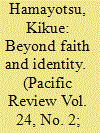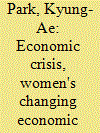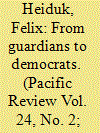|
|
|
Sort Order |
|
|
|
Items / Page
|
|
|
|
|
|
|
| Srl | Item |
| 1 |
ID:
106019


|
|
|
|
|
| Publication |
2011.
|
| Summary/Abstract |
There is a prevailing assumption amongst scholars and observers of Indonesian politics that there is a close link between religious identity and political identity. How valid is this socio-cultural identity model in explaining the party affiliation and political allegiance of increasingly pious Muslim youth to a political organization in the context of democratic consolidation? In particular, how valid is this assumption with consideration to contemporary Indonesian politics? This article engages this debate through a careful analysis of the member recruitment and mobilization of the most successful religious-based Islamist organization in post-authoritarian Indonesia, the Prosperous Justice Party (PKS). The article combines two strands of social movement theory, resource mobilization and opportunity structures, to argue that the PKS's relative success in recruiting committed Muslim youth is explained by two interrelated factors: (1) merit-based cadre recruitment and promotion, which offers young, ambitious and religiously conscious Muslim youth fair and institutionalized political career opportunities and thus incentives to commit themselves to the party's collective interests; and (2) the timing of organizational expansion that coincided with a rapid increase of state office - both executive and legislative - at the sub-national levels as a result of localized democratic elections.
|
|
|
|
|
|
|
|
|
|
|
|
|
|
|
|
| 2 |
ID:
106016


|
|
|
|
|
| Publication |
2011.
|
| Summary/Abstract |
Although many studies have analyzed the gendered impact of economic crisis, few have examined the case of North Korea. This article will explore how North Korea's economic crisis caused changes in women's economic participation. It will also analyze the impact of these new economic roles on the lives of women, and examine the broader implications of these roles for the status of women in North Korea. The North Korean economic crisis changed the pattern of women's economic participation, pulling women out of the formal labor market and driving them into the informal private economic sector. It also forced a number of women to leave their homeland in order to provide support for their own and their families' livelihoods. The new economic roles women have assumed in the wake of the food crisis have affected women's lives in many negative ways, resulting in an increase in their workloads, as well as an increase in the amount of sexual violence and stress of family breakdowns they experience. At the same time, however, these new roles have given women stronger voices in family decision-making matters and allowed them to develop, to some degree, a sense of self-consciousness and awareness of their own rights. Nevertheless, the fact that women have been engaged in new economic activities does not imply that they also have a high likelihood of advancing their socioeconomic status. To the contrary, women's defection from their homeland does not allow them to voice their opinions in matters related to the existing gender inequalities. Moreover, North Korean women are not considered capable of forming a critical mass, as they lack economic, social, political, and organizational resources to collectively voice their discontent. Furthermore, the neo-Confucian tradition of male superiority that is still firmly entrenched in the society is a major barrier that remains to be overcome.
|
|
|
|
|
|
|
|
|
|
|
|
|
|
|
|
| 3 |
ID:
106020


|
|
|
|
|
| Publication |
2011.
|
| Summary/Abstract |
This article explores the role the military has played in the democratization processes of three 'young democracies' (Thailand, Indonesia, the Philippines) in Southeast Asia. The issue of democratization vis-à-vis the armed forces is even more relevant for Southeast Asia as a region with historically powerful militaries and long traditions of political interventions and rampant human rights abuses. While Thailand, Indonesia and the Philippines have historically struggled with deep entrenchments of the military - not only in the political arena, but also within the bureaucracy and the economy - their respective militaries played very different roles within democratization processes. The Indonesian military remained politically neutral after the fall of Suharto, the Philippines witnessed various failed coup attempts by mid-ranking officers, while the Thai military played a key role in the termination of democracy through a coup in 2006. The dominant literature on democratization tries to explain the different outcomes of democratization processes to democracy mainly by focusing on elite choices, new norms and values, shifts in conjunctural situations, the unraveling of the institutional structures of authoritarian regimes and the formation of new, democratic institutional structures. Likewise research on civil-military relations in new democracies has pointed to behavioral change, successful structural reforms (downsizing of the military, capacity-building, withdrawing the military from politics) and civilian leadership in defense and security matters as decisive factors for establishing civilian supremacy. Yet none of these factors fully explains why Indonesia's armed forces remained politically neutral after the fall of Suharto, while Thailand's generals launched a coup in 2006. To answer this question more general political dynamics of democratization processes need to be examined, especially with regard to the formation of new alliances of differing social forces and their impact on traditional power structures, in order to understand continuity and/or change in the military's attitudes towards democracy.
|
|
|
|
|
|
|
|
|
|
|
|
|
|
|
|
| 4 |
ID:
106018


|
|
|
|
|
| Publication |
2011.
|
| Summary/Abstract |
There has been an ongoing debate about how (or through what mechanisms) global environmental norms have influenced domestic political debates that give rise to green policy choices. In particular, effective international environmental cooperation between transnational and domestic NGOs has been recognized as a key to successful environmental movements. In this regard, the central question guiding research on the politics of environmental norms is, under what condition(s) transnational cooperation among NGOs would be more likely to be sustained so as to achieve its goals. This article proposes that one of the mechanisms missing from the debate is a bottom-up approach through which transnational cooperation can be forged by the initiation of domestic NGOs. Drawing on social movement literature, it is hypothesized that domestic environmental NGOs with more resources, challenging ideologies, and more contentious modes of protest to dominant paradigms is more likely to nurture, develop, and sustain effective transnational cooperation for environmental norms. The validity of this hypothesis is demonstrated through the examination of wetland reclamation projects in Japan and Korea.
|
|
|
|
|
|
|
|
|
|
|
|
|
|
|
|
| 5 |
ID:
106017


|
|
|
|
|
| Publication |
2011.
|
| Summary/Abstract |
The responsibility to protect (R2P) comprises each state's responsibility to protect its own populations from genocide, war crimes, ethnic cleansing and crimes against humanity, the international community's duty to assist states in this endeavour, and a responsibility for the international community to take timely and decisive action in situations where the host state has manifestly failed. At first glance, the latter two elements of this principle seem to require behaviour that contradicts the principle of non-interference. This raises questions as to why R2P was endorsed by Southeast Asian governments and whether it can be localised in a region whose politics are underpinned by non-interference. This article argues that processes of norm localisation are producing an accommodation between the two principles. This accommodation involves the formal retention of both principles but the subtle realignment of each in order to make them compatible and make support for both coherent. It is this third explanation, we argue, that best explains the relationship between R2P and non-interference in Southeast Asia: R2P has been revised to limit its capacity to legitimise coercive interference, whilst non-interference is in the process of being recalibrated to permit expressions of concern, offers of assistance and even the application of limited diplomatic pressure in response to major humanitarian crises. Thus, whilst the region remains largely hostile to doctrinal revisions to non-interference, subtle changes are evident in practice. This article outlines the evolution of R2P as a challenge to traditional notions of state sovereignty, provides an overview of non-interference and past efforts to revise the principle, and examines two case studies to understand how the two principles are being accommodated in practice.
|
|
|
|
|
|
|
|
|
|
|
|
|
|
|
|
| 6 |
ID:
106015


|
|
|
|
|
| Publication |
2011.
|
| Summary/Abstract |
The 'hub-and-spoke' alliance structure led by the United States was - and remains - a major feature of security politics in the Asia-Pacific. This article links its 'general interests' with the larger issue of the Asia-Pacific's evolving multilateral regional order. After reviewing the concept of 'hedging', the first section problematises the literature that treats the US-led alliances which constitute the hub-and-spoke system mainly as instruments for the competitive side of a hedging strategy. The second section observes that they go beyond being instruments of threat response to becoming a more complicated network of regional multilateral order-maintenance and order-building. The third section claims that the United States and its regional allies have been utilising the hub-and-spoke alliance structure as a hedge against an undesirable multilateral order emerging in the region. The fourth section examines those arguments with reference to the East Asia Summit (EAS) and the Six Party Talks. The article concludes with some thoughts about what these findings mean for the future direction of the hub-and-spoke alliance structure in the Asia-Pacific.
|
|
|
|
|
|
|
|
|
|
|
|
|
|
|
|
|
|
|
|
|